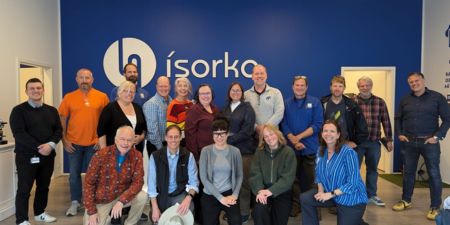
The CREATE faculty made it to Iceland and had forty-eight hours to acclimate, adjust to the time zone, explore the landscape, and experience Independence Day with their Icelandic hosts. The program began with the University of Reykjavik, where we had the opportunity to meet with faculty and researchers specializing in clean energy and electric vehicles (EVs). Iceland has made remarkable strides in clean electricity generation, primarily using geothermal and hydropower. This has resulted in a surplus of renewable energy, allowing Iceland to “export” energy to three major aluminum smelters. Additionally, the country has achieved significant success in the clean space heating sector through geothermal district heating and electric systems. However, the transportation sector remains a critical challenge for reducing greenhouse gas emissions.
One of the most striking takeaways from our discussions was the dramatic impact of government incentives on the EV market. Iceland’s government introduced innovative incentives for EVs four years ago, resulting in EVs comprising 87% of new car sales by 2023, placing Iceland second globally, just behind Norway. However, in 2024, these incentives were repealed due to fiscal concerns about lost tax revenue, causing EV sales to plummet to just 10%.
This policy reversal reminded several CREATE participants of Australia’s experience a decade ago when the world’s first carbon tax spurred a boom in solar and renewable energy markets. The subsequent repeal of the Australian tax led to a market crash and the cancellation of several educational programs in renewable energy.
Interestingly, Iceland is now considering an outright ban on internal combustion engine (ICE) cars. This approach could boost the EV market without the financial burden of incentives. The Icelandic fleet consists of about 150,000 cars, with an average vehicle lifespan of 13.8 years. Thus if Iceland implements a ban on ICE vehicles, it will take nearly two decades to phase out the existing cars that are already on the road, unless some other type of incentive is implemented to encourage early retirement of the legacy cars.
Reykjavik University’s dedication to energy education is evident in their Iceland School of Energy, which offers various programs in sustainable and electric power engineering. This visit underscored how government policy influences vehicle purchasing and driver behavior, and highlighted the need for comprehensive planning in transitioning away from ICE vehicles.
After the University of Reykjavik, CREATE headed to Ísorka, an Icelandic electric vehicle (EV) charging company, and were introduced to the pioneering efforts by Tomas Karl Guisteinsson. Ísorka, founded in 2016, installed Iceland’s first DC fast charger and has since revolutionized the EV charging infrastructure. Notably, they offer phone-controlled charging, allowing users to start and stop sessions remotely—an innovative feature at the time.
By 2018, Ísorka expanded to service providers and significantly grew, especially with apartment buildings joining their network. Their business model eased billing and load balancing for multi-dwelling units, allowing owners to set prices and monitor usage effectively. This growth continued, and by 2023, Ísorka had 3,000 charging stations and nearly 40,000 customers, becoming a crucial player in Iceland’s EV landscape.
Ísorka’s business model features a closed-loop ecosystem, handling everything from installation of hardware, to maintenance, to managing the user experience and back-end payment systems. This ensures a remarkable 99% uptime, a stark contrast to the 59% uptime in the US. Also in contrast to the US, the Ísorka EV charging stations have not experienced any problems with vandalism. This was attributed to the fact that Icelandic youth are educated and aware of the dangers associated with high voltage.
A unique aspect of Ísorka’s operations is their venture into the carbon credit market. As the first EU charging company to offer certified carbon credits, they ensure verifiable credits, adding value in a market often criticized for fraud. Moreover, Ísorka’s network has been designed to facilitate dynamic load management. This allows Ísorka to aggregate and strategically control the EV charging load, and to sell this as a demand response service into the electric power market. This showcases their innovative approach to maintaining a reliable and efficient charging infrastructure. This comprehensive control and their significant role in the carbon credit market position Ísorka as a leader in sustainable transportation solutions in Iceland.
Tomorrow the group will hear more on policy and visit a geothermal and carbon capture site and hear from speakers from ON Power.
Sign up for the CREATE Newsletter and stay updated on the latest information in Renewable Energy Education.
Copyright @ 2025 CREATE National Energy Center
This material is based upon work supported by the National Science Foundation under Grant #2201631. Any opinions, findings, and conclusions or recommendations expressed in this material are those of the author(s) and do not necessarily reflect the views of the National ScienceFoundation.